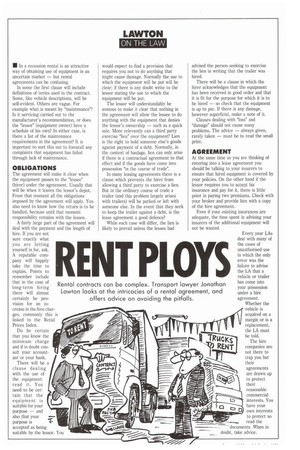• In a recession rental is an attractive way of
Page 40

If you've noticed an error in this article please click here to report it so we can fix it.
obtaining use of equipment in an uncertain market — but rental agreements can be confusing.
In some the first clause will include definitions of terms used in the contract. Some, like vehicle descriptions, will be self-evident. Others are vague. For example what is meant by "maintenance"? Is it servicing carried out to the manufacturer's recommendation, or does the lessor" (equipment owner) have a schedule of his own? In either case, is there a list of the maintenance requirements in the agreement? It is important to sort this out to forestall any complaints that equipment has failed through lack of maintenance.
OBLIGATIONS
The agreement will make it clear when the equipment passes to the "lessee" (hirer) under the agreement. Usually that will be when it leaves the lessor's depot. From that moment all the obligations imposed by the agreement will apply. You also need to know how the return is to be handled, because until that moment responsibility remains with the lessee.
A fairly large part of the agreement will deal with the payment and the length of hire. If you are not sure exactly what you are letting yourself in for, ask. A reputable company will happily take the time to explain. Points to remember include that in the case of long-term hiring there will almost certainly be provision for an increase in the hire charges, commonly this is linked to the Retail Prices Index.
Do be certain that you know the minimum charge and if in doubt consult your accountant or your bank.
There will be a clause dealing with the use of the equipment: read it. You need to be cer tain that the equipment is suitable for your purpose — and also that your purpose is accepted as being suitable by the lessor. You would expect to find a provision that requires you not to do anything that might cause damage. Normally the use to which the equipment will be put will be clear; if there is any doubt write to the lessor stating the use to which the equipment will be put.
The lessor will understandably be anxious to make it clear that nothing in the agreement will allow the lessee to do anything with the equipment that denies the lessor's ownership — such as a quick sale. More relevantly can a third party exercise "lien" over the equipment? Lien is the right to hold someone else's goods against payment of a debt. Normally, in the context of haulage, lien can only arise if there is a contractual agreement to that effect and if the goods have come into possession "in the course of trade".
In many leasing agreements there is a clause which prevents the hirer from allowing a third party to exercise a lien. But in the ordinary course of trade a trailer (and this problem largely arises with trailers) will be parked or left with someone else. In the event that they seek to keep the trailer against a debt, is the lease agreement a good defence?
While each case will differ, the lien is likely to prevail unless the lessee had advised the person seeking to exercise the lien in writing that the trailer was hired.
There will be a clause in which the hirer acknowledges that the equipment has been received in good order and that it is fit for the purpose for which it is to be hired — so check that the equipment is up to par. If there is any damage, however superficial, make a note of it.
Clauses dealing with "loss" and "damage" should not cause many problems. The advice — always given, rarely taken — must be to read the small print.
AGREEMENT
At the same time as you are thinking of entering into a lease agreement you should be talking to your insurers to ensure that hired equipment is covered by your policies. On the other hand if the lessor requires you to accept his insurance and pay for it, there is little point in paying two premiums. Check with your broker and provide him with a copy of the hire agreement.
Even if your existing insurances are adequate, the time spent in advising your insurers of the additional equipment will not be wasted.
Every year LAs deal with many of the cases of unauthorised use in which the only error was the failure to advise the LA that a vehicle or trailer has come into your possession under a hire agreement. Whether the vehicle is acquired on a margin or is a replacement. the LA must be told.
The hire companies are not there to trap you but their agreements are drawn up to protect their reasonable commercial
/ "LIM have your
interests. You
a own interests to protect so read the
documents. When in doubt, take advice.
















































































































